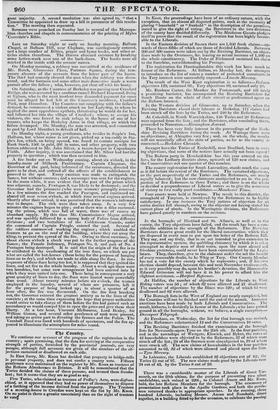Late on Saturday night or early on Sunday morning, Balham
Chapel, at Balham Hill, near Clapham, was sacrilegiously entered, and a large number of Bibles, prayer and hymn books, and other ar- ticles stolen therefrom. The thieves obtained entrance by breaking some lattice-work over one of the back-doors. The books were all marked in the inside with the owners' names.
On Monday morning, a robbery was committed at the residence of Mr. Rotch, Gloucester Place, Portman Square, during the tem- porary absence of the servants from the lower part of the house. The thief had scarcely cleared the area when the robbery was disco- vered, and the footman and some other male domestics made a warm pursuit after the fellow ; who, however, got clear off with his booty.
On Saturday, as the Countess of Berkeley was passing near Cranford Bridge, she was accosted by a sandman named Richard Hopwood, living at Egliam, who in the most insolent tone demanded payment for some sand he alleged he bad left at the Countess's residence, Cranford Park, near Hounslow. The Countess not complying with the fellow's
demand, he commenced a violent attack on her Ladyship, to whom he
applied the most opprobious epithets, threatening he would do for her, and followed her into the village of Cranford ; where, to escape his violence, she was forced to seek refuge in the house of one of her tenants, who keeps the Berkeley Arms in that village, on which the fellow decamped. On Monday, the man was arrested, and committed to gaol by Lord Montfort in default of bail.
. On Monday night, a young gentleman, who resides in Staple's Inn, Holborn, but whose name is not given, picked up a tea-caddy in Sta- ple's Inn, which, on being opened, was found to contain receipts for Bank Stock, 150/. in gold, 20/. in notes, and other property, with two letters addressed to Mr. John Silver, a tavern-keeper in Copenhagen Fields. After inquiry, it was ascertained that Mr. Silver had lost the property in question ; which was then restored to him.
A fire broke out on Wednesday evening, about six o'clock, in the laundry-room of Milbank Penitentiary. Captain Chapman, the Governor of the gaol, being informed of the occurrence, directed the gates to be shut, and ordered all the officers of the establishment to proceed to the spot. Every exertion was made to extinguish the flames, but without success ; and a messenger was sent for the engines. In the mean while, it was evident that the part of the prison which was adjacent, namely, Pentagon 3, was likely to be destroyed ; and the Governor had the prisoners (who were women) promptly removed. In a few minutes the fire reached the Pentagon, and continued un- abated till near seven o'clock, at which time several engines arrived. Shortly after their arrival, it was perceived that the women's infirmary was in danger. The sick were then taken away. In a very few minutes the engines began to play ; and as there was a dike surround- ing the prison, which was full of water, there was of course an abundant supply. By this time Mr. Commissioner Mayne arrived, and was speedily followed by a strong body of Police from different divisions ; and two battalions of the Coldstream Guards, under the command of Captain Pringle, entered the yard. Several of the soldiers commenced working the engines ; which enabled the firemen to go on the roof of the building, where they cut away the tiling, to prevent the spread of the fire. Owing to these exertions, by about eleven o'clock a check was put to the further progress of the flames ; the Female Infirmary, Pentagon No. 3, and part of No. 4 Pentagon being destroyed. It is said that the origin of the fire is to be attributed to the overheating of the iron flues, on which are put what are called the hot-horses (these being for the purpose of hanging linen on to dry), and which are made to slide along the flues. In con- sequence of these flues being too hot, it is supposed that they ignited the linen, and set fire to the whole laundry. About a week ago there were two laundries, but some new arrangement had been entered into by which they were united into one. There being in consequence a very great quantity of linen to dry, the flues were heated more powerfully than usual. About twenty minutes before six o'clock, the women employed in the laundry, several of whom are prisoners, left it for the purpose of being locked up; in about a quarter of an
hour after, the fire was discovered. On the fire first breaking out, the Governor evinced the greatest anxiety as to the lives of the convicts ; at the same time expressing his hope that proper authorities would arrive to take charge of them before the fire had gained such an ascendancy as would compel him to open the gates and give them their liberty. At a late hour, Viscount Melbourne, Lord Bexley, Sir William Gomm, and several other gentlemen of rank were present, and taking an active part in directing the firemen and the Police. The Vauxhall Road was lined with hundreds of spectators, and the fire ap- peared to illuminate the atmosphere for miles round.


























 Previous page
Previous page